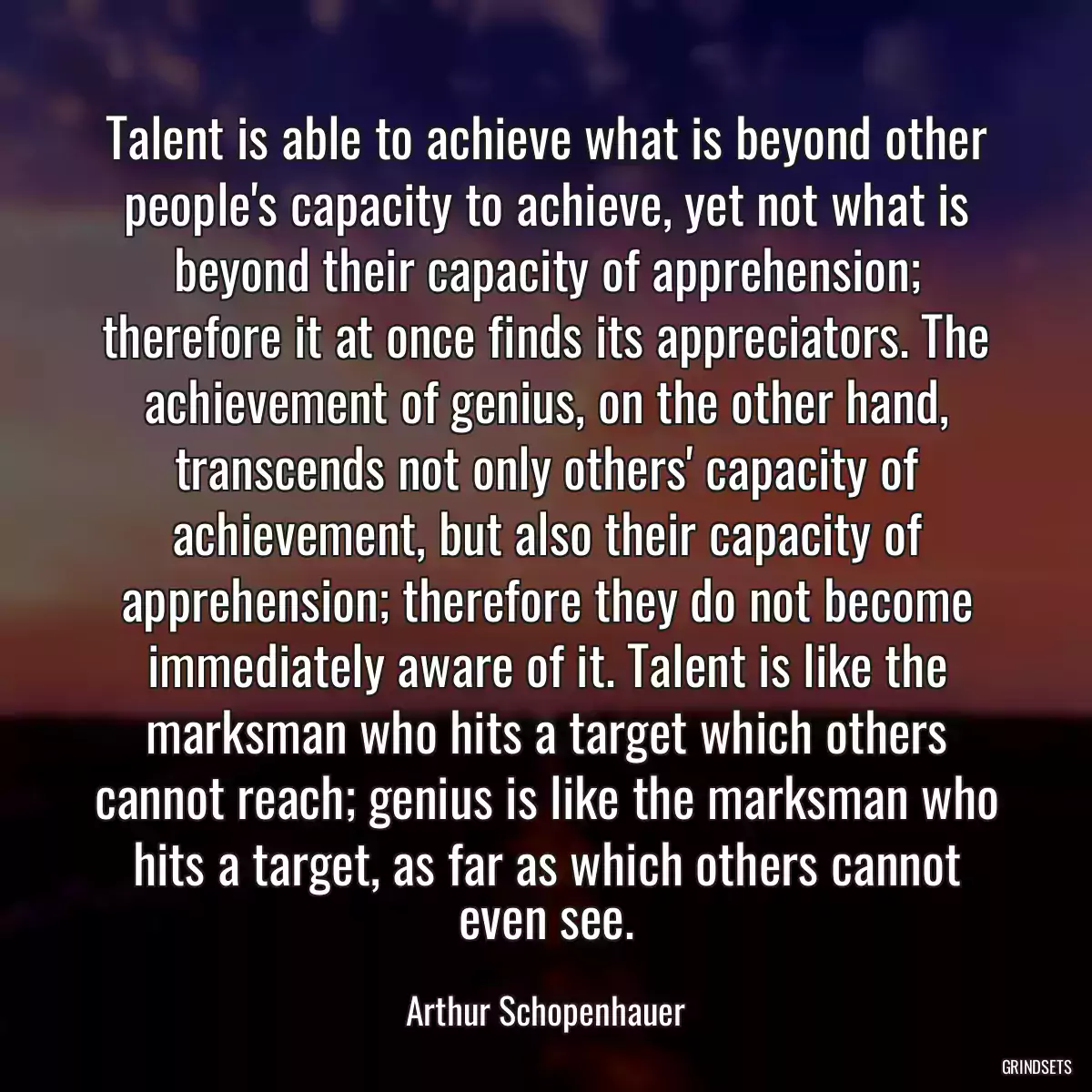
Quotes Arthur Schopenhauer
Find dozens of Arthur Schopenhauer with images to copy and share.

In action a great heart is the chief qualification. In work, a great head.
If children were brought into the world by an act of pure reason alone, would the human race continue to exist? Would not a man rather have so much sympathy with the coming generation as to spare it the burden of existence, or at any rate not take it upon himself to impose that burden upon it in cold blood?
A man of business will often deceive you without the slightest scruple, but he will absolutely refuse to commit a theft.
You may also like
The first forty years of life give us the text; the next thirty supply the commentary on it.
Just remember, once you're over the hill you begin to pick up speed.
The actual life of a thought lasts only until it reaches the point of speech...As soon as our thinking has found words it ceases to be sincere...When it begins to exist in others it ceases to live in us, just as the child severs itself from its mother when it enters into its own existence.
As my own father was sick, and miserably tied to his invalid's chair, he would have been abandoned had not an old servant performed for him a so-called service of love. My mother gave parties while he was perishing in solitude, and amused herself while he was suffering bitter agonies
The mother of useful arts is necessity; that of the fine arts is luxury. For father the former has intellect; the latter genius, which itself is a kind of luxury.

For, after all, the foundation of our whole nature, and, therefore, of our happiness, is our physique, and the most essential factor in happiness is health, and, next in importance after health, the ability to maintain ourselves in independence and freedom from care.
With people of limited ability modesty is merely honesty. But with those who possess great talent it is hypocrisy.
For an act to be moral the intention must be based on compassion, not duty. We do something because we want to do it, because we feel we have to do it, not because we ought to do it. And even if our efforts fail - or we never even get to implement them - we are still moral because our motivation was based on compassion.
The auspices for philosophy are bad if, when proceeding ostensibly on the investigation of truth, we start saying farewell to all uprightness, honesty and sincerity, and are intent only on passing ourselves off for what we are not. We then assume, like those three sophists [Fichte, Schelling and Hegel], first a false pathos, then an affected and lofty earnestness, then an air of infinite superiority, in order to impose where we despair of ever being able to convince.
The poet presents the imagination with images from life and human characters and situations, sets them all in motion and leaves itto the beholder to let these images take his thoughts as far as his mental powers will permit. This is why he is able to engage men of the most differing capabilities, indeed fools and sages together. The philosopher, on the other hand, presents not life itself but the finished thoughts which he has abstracted from it and then demands that the reader should think precisely as, and precisely as far as, he himself thinks. That is why his public is so small.
Consider the Koran... this wretched book was sufficient to start a world-religion, to satisfy the metaphysical need of countless millions for twelve hundred years, to become the basis of their morality and of a remarkable contempt for death, and also to inspire them to bloody wars and the most extensive conquests. In this book we find the saddest and poorest form of theism. Much may be lost in translation, but I have not been able to discover in it one single idea of value.
A man's knowledge may be said to be mature, in other words, when it has reached the most complete state of perfection to which he, as an individual, is capable of bringing it, when an exact correspondence is established between the whole of his abstract ideas and the things he has actually perceived for himself. His will mean that each of his abstract ideas rests, directly or indirectly, upon a basis of observation, which alone endows it with any real value; and also that he is able to place every observation he makes under the right abstract idea which belongs to it.
The bad thing about all religions is that, instead of being able to confess their allegorical nature, they have to conceal it.
You may also like

Talent is able to achieve what is beyond other people's capacity to achieve, yet not what is beyond their capacity of apprehension; therefore it at once finds its appreciators. The achievement of genius, on the other hand, transcends not only others' capacity of achievement, but also their capacity of apprehension; therefore they do not become immediately aware of it. Talent is like the marksman who hits a target which others cannot reach; genius is like the marksman who hits a target, as far as which others cannot even see.
If we were not all so interested in ourselves, life would be so uninteresting that none of us would be able to endure it.